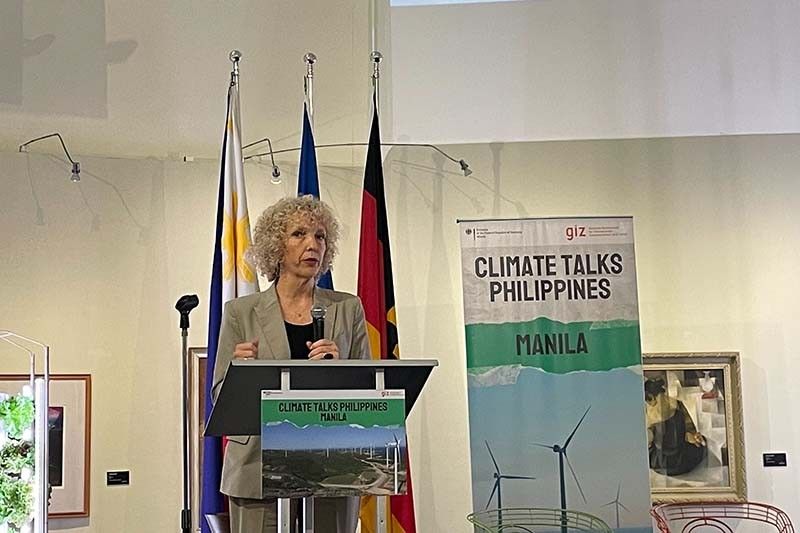Germany's climate envoy: Philippines has 'gigantic' potential in solar, wind power

MANILA, Philippines — Germany can help the Philippines—which has massive renewable energy potential—achieve a cleaner and safer future powered by renewables, Berlin’s climate envoy said on Tuesday.
Jennifer Morgan, German special envoy for international climate action, stressed that renewable energy sources such as wind and solar not only mitigate climate change, but also bring energy security and create economic opportunities.
Morgan, the former international head of Greenpeace, is in the Philippines for a dialogue with government officials on climate action and decarbonization — the reduction of carbon dioxide emissions — in the country’s energy sector.
"The renewable energy resources that the Philippines has are tremendous. I think there is a gigantic potential here for solar rooftops and offshore wind," Morgan said in an event at Yuchengco Museum in Makati City.
"I hope the discussions here can help foster that and accelerate our bilateral collaboration in those areas," she added.
The Philippines is targeting to boost renewables in its current energy mix, which it hopes will hit 35% share by 2030 and 50% by 2040.
In 2020, only 21% of the country’s generated power came from renewables such as solar, wind, hydropower, and geothermal.
Morgan said that Germany, the largest emitter in the European Union, acknowledges its responsibility in contributing to the warming of the planet. Among the objections of smaller economies — including the Philippines in 2016 — to moves to decarbonization is that it could hamper national development.
The Philippines is among the countries considered most vulnerable to extreme weather events caused by the climate crisis, which the international community is trying to address through decarbonization and through ambitious conservation goals.
Morgan visited Tacloban City, worst hit by Super Typhoon Yolanda (Haiyan), on Monday.
RE, energy efficiency
Germany targets to slash planet-warming greenhouse gas emissions by 65% by 2030 from 1990 levels on its way to becoming carbon neutral by 2045.
Morgan said that prioritizing renewable energy and energy efficiency also generates income and jobs. "We have over 340,000 energy-related jobs in Germany. Last year, our exported renewable energy technology was worth more than $10 billion."
The German government remains committed to its goal of phasing out coal as a power source by 2030 even as it reactivates coal-fired power plants. Morgan said the step was only a "short-term emergency measure" to manage an energy crisis caused by the Russian invasion of Ukraine.
"Russia’s war of aggression has certainly highlighted the connection between fossil fuel imports, energy, climate security, and peace," Morgan said.
According to Berlin’s climate envoy, Europe’s biggest economy is scaling up the installation of solar powers to enhance its energy security.
"We know that in the medium- and long-term, fossil fuels — they don’t make you safer or more prosperous. In the long term, they make you more vulnerable," Morgan said.
"And only if we can work together can we drive that zero carbon economy and avoid even more devastating impacts… That’s why I’m so pleased to be here and thinking with the Philippine government how we can accelerate our work together, how we can learn from you, and you can learn from us," she added.
Nuclear era
Germany on Saturday switched off its last three nuclear reactors, exiting atomic power even as it seeks to wean itself off fossil fuels.
Berlin has been looking to leave behind nuclear power since 2002, but the phase-out was accelerated by former chancellor Angela Merkel in 2011 after the Fukushima nuclear disaster in Japan.
Meanwhile, the Philippines is eyeing to build nuclear power plants—a controversial pet project of the ousted dictator Ferdinand Marcos Sr.—despite opposition from groups such as the Center for Energy, Ecology and Development and Greenpeace Philippines who have warned that nuclear energy is not cheap, clean, and safe.
The government is also ramping up the development of infrastructure that will support the import of liquefied natural gas.
"The Philippine strategy is to have more options and stop disqualifying certain technologies. However, even if we are open to these technologies, every technology should abide by our environmental laws and standards and it should be compliant with the demands of the demand sector. It should not be supply-driven," Energy Undersecretary Wimpy Fuentabella said.
- Latest






























